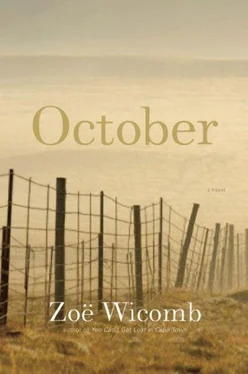He is dead; he is dead; he is dead, she says out loud. And she, Mercia, must live, will live, as long as she can get away. Out of Kliprand. Out of the country. For the moment Jake is being cared for, but she cannot think what to do about Sylvie. She does not want to see the girl, for in her heart Mercia can find not a scrap of the compassion that the girl undoubtedly deserves. Of course it is shameful, but vacillating between guilt and disgust, she does not know how to manage, how to fulfill her responsibility toward Sylvie. How will she conceal her revulsion? Oh, she knows that it has unfairly been transferred from Nicholas, but it is revulsion all the same. Somewhere in her heart she must find compassion for the child abused by an old man, but her heart is tired, recalcitrant, and will not do the mind’s bidding.
A check — that will have to do, but later, all in good time. Right now Mercia does not want to think of them, her people. To live, she must think of a life elsewhere. Yes, she is driving to Cape Town, but she has to propel herself into another time, another country. She would rather think of the absence that is Craig.

Throughout that cold summer in Glasgow Mercia had shivered in a coat, an unfashionable gray coat she had not worn for years, which she wrapped around herself, belted, to keep out the chill of being unloved — an actual chill — to keep pain from spilling out into everyday business. Was there no end to grieving? How long, she wondered impatiently, would she go on feeling sorry for herself?
Mercia mulled over the many words and expressions for being abandoned, through a range from the hurtful “dumped” to the far-from-neutral “being left,” and settled for a euphemism that is also said of the dead. Craig had departed. At the time, she claimed that his departure came out of the blue, a bolt that struck at a perfectly happy relationship. Thus, if Craig’s departure came as a surprise, she had not been vigilant, had not kept a close enough eye on things or, even more distressing, had turned a blind eye to signs of his disaffection, for signs there must have been. Why, for instance, had she insisted on an Easter break by the sea when he so hated that kind of holiday?
Now it strikes her as shameful that she, a woman devoted to the close reading of words and actions on the page, failed to keep track of events in her own life. Blinded by grief, and perhaps, she must confess, by the condition of having been left, for she has not always been able to separate the two, she has not arrived at an explanation for what happened.
If the time has come to reexamine the preceding months, or as Mercia is forced to revise, the preceding decline, it must mean that she is recovering. So once more she picks over Craig’s departure as one does a scab, even as she fears from the previous, barely acquiescent flake that it is too soon, that blood will once again ooze, that a new scab will form to protect the wound, and so delay recovery. But the thinking person must press on. There is some satisfaction to be found in the crumbly bits willingly prised away from the healing wound to reveal queer new flesh that will grow accustomed to air and light, that must eventually merge with the old, leaving a barely visible vestige of the injury. It would be prudent to stop there, to leave alone the rest that is not ready to be picked at. If she claimed at the time that her heart would never mend, it is the case that the scab is smaller, that there is less of a temptation to pick at it prematurely.
The ready-made belief in time-will-heal is after all not to be scoffed at. One day, in its own time, the remnant scab too will depart, leave of its own accord, simply flake off unnoticed, and disappear, leaving in its place the shiny new skin. But Mercia cannot remember ever being caught out in that way. No, scabs are attention seekers. There is usually an eager itch that begs for a helping hand, even if it is premature, a false appeal. Thus the metaphor brings a warning: she must be careful in picking over their last months together. If she is committed to conscientious close reading there is also the danger of probing prematurely or too deeply for her own good. A woman of a certain age must be careful not to destroy herself.
And neither will Mercia be destroyed by her father.

Mercia had wanted Craig to go home with her, but he was adamant that the Cape was too far, too expensive, would take up too much time. He hated long flights so that she looked for somewhere closer where they could go for a week.
Hell no, Craig said, who wants to laze at a resort for British tourists reddening in the sun, fanning themselves with the Daily Record ? Do I need a holiday? Anyway, what’s wrong with the cottage on the Solway?
It’s too cold. Besides, you don’t read the Daily Record and you are British, so. .
Beg your pardon, hen, I’m Scottish, he interrupted.
Well, just because you’re a tourist, doesn’t mean that you have to eat burgers and chips at McDonald’s, and swill beer at the Irish pub. There’s plenty of scope to be different.
Good old considerate Craig had forgotten that she was the one with a full-time job, the one exhausted by teaching and the pressures of publishing, who needed a break. No wonder her tone was sneering. The next day she wheedled, Oh come on, Craig, I’ll die if I have to wait for a sun that may or may not show up. We’ve been to the Solway, now I need to get away, farther away.
What’s wrong with you? Why can’t you stay put, enjoy leisure without thrashing about in airports? Are you not getting too old for this wanderlust? You know that banging on about sunshine is an excuse. You just want to be on the move, get to as many places as possible. Tick them off. Conspicuous consumption of space, eh?
Mercia laughed, let it go. Except she would insist on the sunshine. It is the case, she said, that black people need more sunlight, that here in Scotland the expats — oops, I should say immigrants — are developing rickets.
Craig picked up his guitar and started humming to a poor execution of “A Hard Rain’s A-Gonna Fall.” Mercia knew that if she arranged everything, every detail, paid for the flights, he would succumb. Which swung it. So, why did she not go on her own? That, she decides, is an unreasonable question. And why, after all those years, twenty-four to be precise, did they have separate bank accounts? Neither of them wanted to be married; the apartment was bought in both their names, but why the pitiful calculations for a kitty as prices fluctuated, the counting of pennies like students in a rented house? Yes, that was what they examined — bills and receipts, rather than their lives.
When they first moved in together Craig said that as a feminist she would want to keep separate finances. Then they would not, like children, have to ask each other for permission to buy anything, he said, as she demurred. For Mercia there was no question of not being independent. Now it seemed absurd, an overvaluing of money, and bugger all to do with independence, equality, or feminism. Why would common finances involve her asking for permission to spend? Surely as responsible adults they could have trusted each other, even indulged each other. As it became clear that Mercia would earn more in her senior position at the university, the issue of finances was not revisited. Perhaps it would not have been possible for Craig, the poet with a part-time post, to raise it.
Now Mercia winces at the vulgarity of waiting a year until Craig could manage to overhaul the heating system, afford his share of an expensive new boiler and radiators, and she blushes at the arrangement of contributing 65 percent to the gas bill since it was she who wanted heating during the summer evenings. How did they arrive at the figure? Did neither of them notice that instead of simplifying their lives, separate finances brought endless dreary consultations and calculations? How, she wonders, could a relationship survive such tedious, such shameful arithmetic? Neither of them was after all a spendthrift or a gambler. How much simpler, more civilized, it would have been to throw all money into the same pot and help themselves as and when the need arose.
Читать дальше













